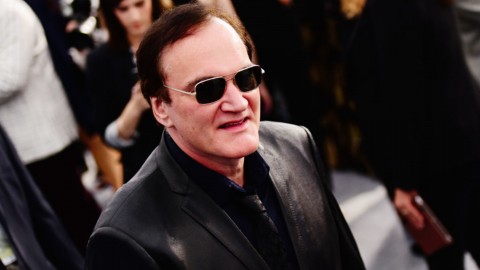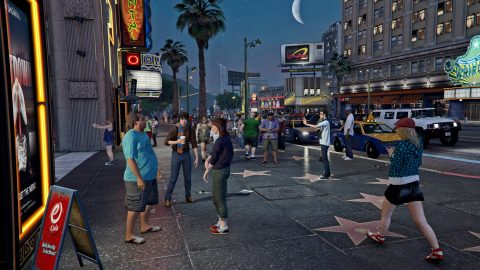
To build word of mouth off live performance is a challenge during normal times, but to do it when gigs are scarce takes a seismic force of nature. Enter Brooklyn’s Catcher, who have enjoyed a lightning quick ascent despite the pandemic-induced slowdown. In the past year and half since Austin Eichler and Wilson Chestney relocated from Texas, the now six-piece’s furious post-punk din has shaken venues across NYC to their foundations, with frontman Eichler leading the charge, stalking the stage with a singular, confrontational intensity.
Catcher seem to have arrived at precisely the right moment to remind a city of starved concert-goers how visceral and exhilarating a live show can be. And as far as Chestney is concerned, the feeling is mutual: “The first time I ever played a show back in Texas, I knew this is what I was going to do. It was almost like I had no choice anymore because it was clear nothing was going to fulfill me the way this does.”
Yet despite their seemingly natural predilection for performance, it turns out that Catcher were anything but preordained. Eichler and Chestney met in Texas while attending film school; Chestney because of a long-held interest, Eichler because he dropped out of a history course and was “already racking up student debt, so I might as well learn something I knew nothing about.” Both had previously dabbled in music and began to collaborate, though not with any specific intention at first. Wilson recalls some early writing experiments that involved the two of them scoring vintage Czechoslovakian children’s animations. Eventually, the two did form a proper band and began playing the local Austin, Texas circuit. But both began to feel restless, which was only exacerbated when the pandemic struck. They took it as a sign that they needed a fresh start in a new city.
“The difficult part was because we moved during COVID, it wasn’t so easy to go out and meet people,” says Eichler. “On the plus side, we did get a lot of writing done.” Yet even in the absence of the normal out and abouts, Catcher was able to come together with surprising speed thanks to the addition of Chestney’s childhood friend, Cameron McRae, and some like minded musicians recruited via social media. It also probably didn’t hurt that they found an early advocate in Mercury Lounge employee, Julia Austin, who now manages the group. (The story eerily echoes one from another NYC band of yore: Ryan Gentles famously discovered The Strokes when he was a junior booker for The Mercury Lounge.)
While post-punk has never really left NYC, it’s fair to say it’s been enjoying somewhat of a resurgence of late thanks to bands like Nation of Language and Geese. But whereas most bands under the broad banner of post-punk take a more nuanced, formalist approach, Catcher deal primarily in blunt force trauma. Their caustic throb owes much more to the first wave of primordial practitioners like The Birthday Party and The Fall. Eichler expresses particular admiration for the latter: “In high school, I remember listening to a YouTube playlist and coming across the song ‘Who Makes the Nazis.’ As soon as I heard Mark E. Smith, I was like, ‘This is music.’”

Following a tour this past fall, the band opted to immediately record their first album, which, by design, captures the fiery intensity of their live shows. “We were able to record everything very quickly because we recorded it all in our apartment live at the same time, except for vocals,” says Chestney. “We just set up dividers between the amps and kept a separate drum room.” ‘The Fat Of A Broken Heart’, due February 18, benefits from understated production and allows the band to play to its obvious strengths on tracks like early single ‘Comparing Saviors and Friends’, a frenzied, blood-on-the-wall onslaught held together by Eichler’s foreboding croon.
Although the album certainly works as a megadose of adrenaline, a scan of the lyrics suggests Catcher’s obsessions are far removed from the typical twenty-something concerns. On songs like ‘Hunger’, ‘The Skin’, ‘Cluster Flies’, and claustrophobic new single ‘Behind a Bleeding Heart’, the band dispense with the clichéd, youthful tales of invincibility and instead stare down the ugly truths of death and decay.
While it was not conscious, Eichler and Chestney attribute the album’s weighty themes to a shared day job of caring for a dementia patient. Both visited him regularly for half a year, and in hindsight, Eichler believes it had a profound impact on the record. “The toughest part was seeing him have moments of clarity because it gave us glimpses of what his life might have been like before [the dementia],” he says.
And yet as “dark and depressing” as it was for Eichler and Chestney to watch dementia take its course, they’ve managed to channel any negative energy into something life-affirming both on record and onstage. Far from despairing, their rage comes across as a stirring, urgent provocation: if you’ve never seriously contemplated mortality, how can you say you’ve ever really lived?
Catcher’s debut album ‘The Fat Of A Broken Heart’ is released February 18
Radar Roundup: sign up and get our weekly new music newsletter
The post Catcher: New York punks exploring the joy and despair of youth appeared first on NME.





